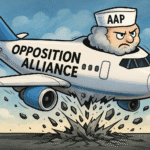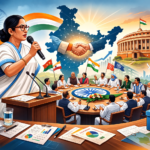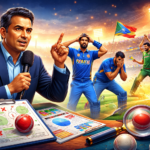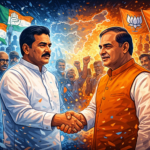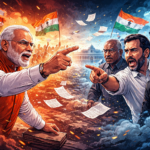When it comes to India-Pakistan cricket matches, passions soar higher than sixes at the Wankhede. But this time, the pitch isn’t just grass—it’s lined with political landmines and moral arguments. Former cricket hero Yuvraj Singh’s recent fiery remark about the India Pakistan cricket match being a case of “moral bankruptcy” has thrown the gentleman’s game into a not-so-gentle spotlight. But before you grab your bat of opinions and gloves of outrage, let’s walk through this bowl full of googlies and gaffes.
- The Match That Lit a Fire
- Yuvraj Singh Drops a Bombshell
- Shahid Afridi: The Political Showstopper
- Political Pitch Invasion
- Is It Just a Game?
- The Business of Cricket Diplomacy
- Public Reaction: Mixed Like a Pakoda Platter
- The Real Oversight: Transparency
- Cricket’s Identity Crisis
- In Summary: Beyond Boundaries?
The Match That Lit a Fire
Cricket is religion in the subcontinent. And an India Pakistan cricket match? That’s a full-blown divine spectacle. So when the Indian Legends team faced off against the Pakistani side in the World Championship of Legends (WCL)—a tournament that’s more nostalgia trip than ICC grandeur—it shouldn’t have been such a big deal. But it became one.
Why? Because former cricketers don’t just carry cricket gear—they carry political baggage, ideological expectations, and, sometimes, unresolved rivalries. The fact that the match featured Shahid Afridi—yes, the same Afridi who often wears political opinions like cologne—didn’t help.
Yuvraj Singh Drops a Bombshell
Enter Yuvraj Singh, the sixer-king, the cancer warrior, the man who once made Stuart Broad question his career choices. This time, he wasn’t swinging the bat—he was swinging at the organizers of the match.
Calling the match a display of “moral bankruptcy”, Yuvraj publicly slammed the decision to play against a Pakistani side featuring Afridi, citing the long-standing tension between the two countries and the perception of insensitivity to national sentiment.
In simpler terms: “Bro, we don’t play gully cricket with guys who mock our country.”
Shahid Afridi: The Political Showstopper
Afridi has never been your average ex-cricketer who retires and vanishes into commentary booths and gym selfies. He’s got strong views, strong words, and a strongly divided fanbase. His past remarks on Kashmir and the Indian army have left a bitter taste in the mouth of Indian fans and public figures alike.
So, when he appears in a match against Indian legends, it’s more than just cricket. It’s seen as rubbing salt on a wound—and Yuvraj made sure to highlight that.
Political Pitch Invasion
But wait—cricket isn’t the only sport being played here. Politics, too, is dancing down the wicket.
Shiv Sena (UBT) MP Priyanka Chaturvedi chimed in with a strongly-worded reaction supporting Yuvraj’s stance. She stated that honoring a player like Afridi with friendly competition is not just insensitive—it’s shameful. According to her, this match wasn’t just about overs and wickets—it was about overlooking national sentiment.
On the flip side, some political voices called for calm, suggesting sports should rise above boundaries. That’s the kind of “Why can’t we just get along?” energy that looks good on banners but rarely survives Twitter.
Is It Just a Game?
Here’s where it gets murky. Can sports exist in a vacuum, untouched by geopolitics?
Cricket fans have always debated this. Some argue that sport is about peace, dialogue, and unity—look at how ping pong softened U.S.–China relations back in the 70s. Others say you can’t high-five your way through a rivalry steeped in blood, conflict, and national trauma.
Yuvraj’s moral bankruptcy comment wasn’t aimed at fans enjoying the match. It was a call-out to decision-makers. Should we be romanticizing nostalgia matches when the man in the opposition lineup once accused India of human rights violations? Or is this just a chance for aging players to enjoy one last hurrah?
The Business of Cricket Diplomacy
Let’s not ignore the economics. Organizers of tournaments like WCL aren’t ambassadors—they’re businessmen. A match between India Pakistan cricket legends brings in views, clicks, sponsorships, and headlines (you’re reading one now, aren’t you?).
The morality of such decisions often gets overruled by money. After all, controversy is a currency too. One could argue the tournament succeeded more because of the outrage than the actual gameplay.
Public Reaction: Mixed Like a Pakoda Platter
Social media, as expected, exploded. Some fans rallied behind Yuvraj, calling him a true patriot. Others accused him of hypocrisy, pointing out times when he had endorsed peace talks or played IPL with Pakistani players before the ban.
Then there were cricket purists, who just wanted to enjoy some good cover drives without a political lecture. “Can’t we just have fun watching Sehwag swing like the old days?” they pleaded.
Well, it’s complicated.
The Real Oversight: Transparency
One big question still remains—did the players know who they’d be playing against when they signed up? If the Indian team was unaware of Afridi’s participation until the toss, then the finger should point at the organizers. Transparency, after all, is the bare minimum when your lineup includes men who’ve worn the national jersey with pride.
If they did know, then silence until backlash raises more questions than answers.
Cricket’s Identity Crisis
The India Pakistan cricket match saga is more than a one-off drama. It reflects the identity crisis in global cricket. Where does one draw the line between entertainment and ethics? Can legends turn into influencers and brand ambassadors without becoming diplomats too?
Yuvraj Singh’s “moral bankruptcy” phrase may be dramatic, but it cracked open a box that’s been hidden under stadium benches for too long.
In Summary: Beyond Boundaries?
Let’s be honest—cricket in the subcontinent is never just a sport. It’s theatre, politics, religion, nostalgia, and rebellion—served with biryani and emotion. The India Pakistan cricket match in WCL was never going to be a quiet affair.
Yuvraj Singh didn’t just stir the pot—he dropped a doosra into the boiling cauldron of public sentiment. Whether you agree with him or not, you can’t deny he’s brought moral questions to the front foot.
Should we treat such matches as bridges or betrayals? Are we cheering for peace or profiting from provocation?
That’s for the nation to decide. For now, one thing is clear—when cricket meets controversy, it’s always a full toss straight into the headlines.







